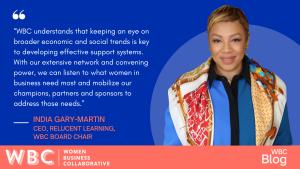
The Power of Collaboration: An Era of Resilience, Progress, and Innovation for Women in Business
April 28, 2025

In today’s fast-moving business world, organizations are facing challenges that are testing their ability to adapt quickly and stay ahead. For women in business and women-owned companies, these hurdles can be even more daunting. Since January 2025, the landscape has continued to shift rapidly, making it clear that agility, collaboration, and shared knowledge are more crucial than ever. Recent statistics highlight the scope of the challenge: women now account for nearly 30% of entrepreneurs globally, yet they still face persistent barriers—such as limited access to financing, mentorship, and leadership opportunities. The World Bank estimates that women-led businesses tend to generate up to 20% less revenue than their male-led counterparts, primarily because of systemic inequalities that remain unaddressed.
But entrepreneurial challenges are just one piece of the puzzle. Women also remain vastly underrepresented in corporate leadership roles. According to the Women Business Collaborative’s (WBC) 2024 Women CEOs in America Report, women occupy approximately 10.4% of CEO positions in Fortune 500 companies, a figure that has seen modest growth over the past few years but remains far from parity. In the boardroom, women hold about 30% of board seats at Fortune 500 firms, which, while an improvement from previous decades, still leaves significant room for growth and is beginning to decline once more. This underrepresentation impacts decision-making at the highest levels and influences corporate culture, policies, and opportunities for women at every level.
In addition to corporate leadership, women’s roles in sports management—particularly in office and administrative functions—are also critical to note. A recent report from the Women’s Sports Foundation highlights that women occupy only about 15% of executive and senior management roles within professional sports organizations. Many of these positions include marketing, operations, and administrative leadership, but women remain significantly underrepresented in decision-making roles that shape the direction of sports organizations. The underrepresentation of women in these influential roles reflects broader societal and industry-specific barriers that continue to limit women’s full participation in the sports industry.
The current environment—marked by technological advances, geopolitical shifts, and changing regulatory landscapes—demands that women-led organizations be nimbler and more resilient. For women entrepreneurs, the pandemic’s aftermath has created additional hurdles. Since January 2025, global reports indicate women have lost around 2.5 million jobs, with women entrepreneurs facing increased difficulty securing funding—receiving less than 5% of venture capital in many regions. These realities underscore the importance of organizations like WBC, which is uniquely positioned to help navigate these challenges through its ability to convene stakeholders, build advocacy frameworks, and share best practices.
WBC understands that keeping an eye on broader economic and social trends is key to developing effective support systems. With our extensive network and convening power, we can listen to what women in business need most and mobilize our champions, partners and sponsors to address those needs. For example, data shows that women hold only about 28% of senior leadership roles in Fortune 500 companies, and this percentage has grown only slowly over recent years. This persistent underrepresentation highlights the necessity of targeted advocacy and strategic action. We continuously assess the most effective way to provide sustainable value to our community. Our ability to collect, synthesize and share common data points and strategies is not only helpful in establishing best practices, but is crucial in helping our community self-assess blind spots.
At a time when change is constant, companies must be able to move quickly. Speed and agility are essential, and collaboration is the key to achieving them. When organizations come together—sharing insights, resources, and strategies—they can adapt faster and more effectively. Navigating governmental edicts and legal updates can be complex. By bringing together partners, donors, and champions regularly, the WBC is helping create a “center of excellence,” a community-driven space where organizations can learn from each other and develop effective strategies faster.
Throughout all this, the WBC remains rooted in its core values: integrity, courage, and collaboration. These principles guide our efforts to build a future where gender equality and business success go hand in hand. The goal is to create an environment where every woman-owned business and every woman in the workplace can reach her full potential. As an example, women-led startups are 63% more likely to outperform competitors—but barriers still exist and addressing them requires collective effort.
This work is inspired by voices like Ursula Burns, the trailblazing former CEO of Xerox, who once said, “Dreams do come true, but not without a lot of work. And then, a lot of resilience.” Her words serve as a reminder that progress isn’t easy, but with perseverance and resilience, women can and do break through barriers and achieve extraordinary success.
As the business environment continues to evolve unpredictably, the need for teamwork and innovation has never been greater. The WBC isn’t just a network—we are a movement dedicated to transforming the future of women in business. By promoting shared learning, advocacy, and community support, we strive to break down barriers and accelerate progress. Together, we can create a world where women lead with strength, clarity, and confidence, shaping the economy of tomorrow with resilience and purpose.
Author
-

India Gary-Martin is Founder and CEO, Leadership For Execs and Relucent Learning, and WBC's Board Chair. She a 25-year veteran of financial services and a member of the Forbes Coaches Council. She has held global C-Suite roles (COO, CIO and CTO) including expatriate assignments in London, Frankfurt, Tokyo and Hong Kong. In her final role at JPMorgan, India was Managing Director & Global Chief Operating Officer for Investment Banking Technology and Operations where she had operational responsibility for 15,000 staff in more than 40 global locations with a multi billion (USD) budget per year. Read full bio here
View all posts

